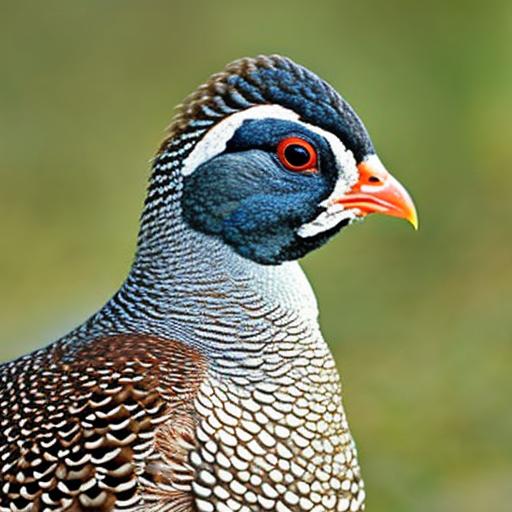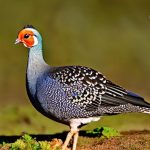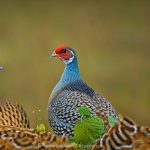Guinea fowl are fascinating birds with unique behaviors that make them a popular choice for poultry enthusiasts. These birds are known for their social nature and strong flocking instincts. They are highly active and curious, constantly foraging and exploring their surroundings. Guinea fowl are also excellent at alerting their owners to potential threats, as they are naturally vigilant and vocal birds. Understanding the behavior of guinea fowl is crucial for providing them with the proper care and environment they need to thrive.
Guinea fowl are highly social birds and thrive in the company of their own kind. They form strong bonds within their flock and rely on each other for safety and companionship. It is important to keep guinea fowl in groups of at least three or more to prevent them from becoming stressed or lonely. Additionally, guinea fowl are known for their strong territorial instincts and may become aggressive towards other birds or animals that encroach on their space. Providing them with a secure enclosure and plenty of space to roam will help prevent any territorial disputes. Understanding their social behavior and territorial instincts will help you create a suitable environment for your guinea fowl to live happily and harmoniously.
Key Takeaways
- Guinea fowl are social birds that exhibit flocking behavior and prefer to roost in trees at night.
- A secure enclosure with high fencing and a covered top is essential to protect guinea fowl from predators.
- Guinea fowl require a shelter that is well-ventilated, dry, and provides protection from extreme weather conditions.
- A balanced diet of grains, seeds, insects, and access to clean water is crucial for the health of guinea fowl.
- Regular interaction with humans and other animals, as well as socialization within the flock, is important for the well-being of guinea fowl.
Creating a Secure Enclosure
Creating a secure enclosure is essential for the safety and well-being of your guinea fowl. Guinea fowl are known for their strong flying abilities and can easily escape from poorly constructed enclosures. When designing a guinea fowl enclosure, it is important to consider their need for space to roam and forage, as well as their natural inclination to roost in trees at night. The enclosure should be spacious enough to allow the birds to move freely and engage in natural behaviors such as dust bathing and foraging for insects.
In addition to providing ample space, the enclosure should also be predator-proof to protect the guinea fowl from potential threats. This includes securing the perimeter with sturdy fencing that extends underground to prevent digging predators from gaining access. It is also important to cover the top of the enclosure with netting or wire to prevent aerial predators from swooping in. Providing shelter within the enclosure, such as a coop or sheltered area, will give the guinea fowl a safe place to roost at night and seek refuge from inclement weather. By creating a secure enclosure that meets the needs of guinea fowl, you can ensure that they are protected and able to thrive in their environment.
Providing Adequate Shelter and Comfort
Guinea fowl require adequate shelter to protect them from the elements and provide a safe place to roost at night. When designing a shelter for guinea fowl, it is important to consider their natural behaviors and preferences. Guinea fowl are known for roosting in trees at night, so providing elevated roosting poles or platforms within the shelter will allow them to exhibit this natural behavior. The shelter should also be well-ventilated to prevent moisture buildup and provide a comfortable environment for the birds.
In addition to roosting space, the shelter should also provide protection from predators and inclement weather. Sturdy construction and secure doors or openings will help keep the guinea fowl safe from potential threats. Providing nesting boxes within the shelter will give the hens a place to lay their eggs and provide a sense of security. It is important to regularly clean and maintain the shelter to ensure that it remains a comfortable and healthy environment for the guinea fowl. By providing adequate shelter that meets the natural behaviors and needs of guinea fowl, you can ensure that they have a safe and comfortable place to rest and seek refuge.
Offering Proper Nutrition and Water
Proper nutrition is essential for the health and well-being of guinea fowl. These birds are natural foragers and thrive on a diet of insects, seeds, and vegetation. In addition to foraging, it is important to provide a balanced commercial feed specifically formulated for guinea fowl to ensure that they receive all the essential nutrients they need. The feed should be high in protein to support their active lifestyle and promote healthy feather growth.
In addition to a balanced diet, access to fresh, clean water is crucial for guinea fowl. These birds are highly active and require ample hydration, especially during hot weather or when laying eggs. Providing multiple water sources within the enclosure will ensure that all the guinea fowl have access to water at all times. It is important to regularly clean and refill the water containers to prevent contamination and ensure that the water remains fresh and palatable for the birds. By offering proper nutrition and access to clean water, you can ensure that your guinea fowl remain healthy and energetic.
Regular Interaction and Socialization
Guinea fowl are highly social birds that thrive on interaction with their owners and flock mates. Regular interaction and socialization with humans will help tame the birds and make them more comfortable with human presence. Spending time with your guinea fowl, talking to them, and offering treats will help build trust and strengthen your bond with them. It is important to approach guinea fowl calmly and gently to avoid startling them, as they can be skittish around unfamiliar stimuli.
In addition to human interaction, guinea fowl also benefit from socializing with their own kind. Providing them with plenty of space to roam and engage in natural behaviors will encourage social interaction within the flock. It is important to observe their interactions and intervene if any aggressive behavior arises, as this can lead to injuries or stress within the flock. By regularly interacting with your guinea fowl and providing opportunities for socialization, you can help them feel secure and content in their environment.
Implementing Visual Deterrents

Guinea fowl are naturally vigilant birds that are quick to sound an alarm at the sight of potential threats. Implementing visual deterrents around their enclosure can help deter predators and reduce stress on the guinea fowl. Reflective objects such as CDs or mirrors can be hung around the perimeter of the enclosure to create visual disturbances that may deter predators. Scarecrows or decoy predators can also be placed strategically around the area to create the illusion of a threat.
In addition to visual deterrents, it is important to regularly inspect the perimeter of the enclosure for any signs of potential predators or weak spots in the fencing. Keeping the area well-maintained and free of debris will help reduce hiding spots for predators and make it easier to spot any potential threats. By implementing visual deterrents and regularly inspecting the enclosure, you can help create a secure environment for your guinea fowl.
Training and Conditioning Techniques
Training and conditioning techniques can be used to teach guinea fowl to respond to certain cues or commands, making it easier to manage them in a domestic setting. Positive reinforcement techniques such as offering treats or praise can be used to encourage desired behaviors such as returning to the enclosure at night or coming when called. It is important to be patient and consistent when training guinea fowl, as they may take time to learn new behaviors.
In addition to training, conditioning techniques can be used to acclimate guinea fowl to certain stimuli or situations. For example, gradually exposing them to new environments or introducing them to handling can help reduce stress and make them more adaptable. It is important to approach conditioning techniques with care and sensitivity, taking into account the natural instincts and behaviors of guinea fowl. By using training and conditioning techniques, you can help create a harmonious relationship with your guinea fowl and make it easier to manage them in a domestic setting.
In conclusion, understanding the behavior of guinea fowl is essential for providing them with the proper care and environment they need to thrive. Creating a secure enclosure, providing adequate shelter and comfort, offering proper nutrition and water, regular interaction and socialization, implementing visual deterrents, and using training and conditioning techniques are all important aspects of caring for guinea fowl. By taking these factors into consideration, you can ensure that your guinea fowl remain healthy, happy, and secure in their environment.
Looking for ways to keep your guinea fowl from running away? Check out this helpful article on PoultryWizard for tips on creating a secure and spacious coop for your guinea fowl. A well-designed coop can provide a safe and comfortable environment for your birds, reducing the likelihood of them wandering off.
FAQs
What are some common reasons guinea fowl run away?
Guinea fowl may run away due to fear, lack of proper shelter, inadequate food and water, or being startled by predators.
How can I prevent guinea fowl from running away?
To prevent guinea fowl from running away, provide them with a secure and spacious coop, ensure they have access to proper food and water, and regularly interact with them to build trust.
What are some effective methods for keeping guinea fowl from running away?
Some effective methods for keeping guinea fowl from running away include clipping their wings, using fencing or netting to create a secure enclosure, and providing them with companionship to reduce their desire to wander.
Are there any specific breeds of guinea fowl that are less likely to run away?
While individual temperament can vary, some breeders and owners have reported that certain breeds, such as the Helmeted Guinea Fowl, may be less likely to run away compared to other breeds.
What should I do if my guinea fowl does run away?
If your guinea fowl does run away, try to locate and safely capture them as soon as possible. You can also consider using a trained dog or other guinea fowl to help lure them back.
Meet Walter, the feathered-friend fanatic of Florida! Nestled in the sunshine state, Walter struts through life with his feathered companions, clucking his way to happiness. With a coop that’s fancier than a five-star hotel, he’s the Don Juan of the chicken world. When he’s not teaching his hens to do the cha-cha, you’ll find him in a heated debate with his prized rooster, Sir Clucks-a-Lot. Walter’s poultry passion is no yolk; he’s the sunny-side-up guy you never knew you needed in your flock of friends!







